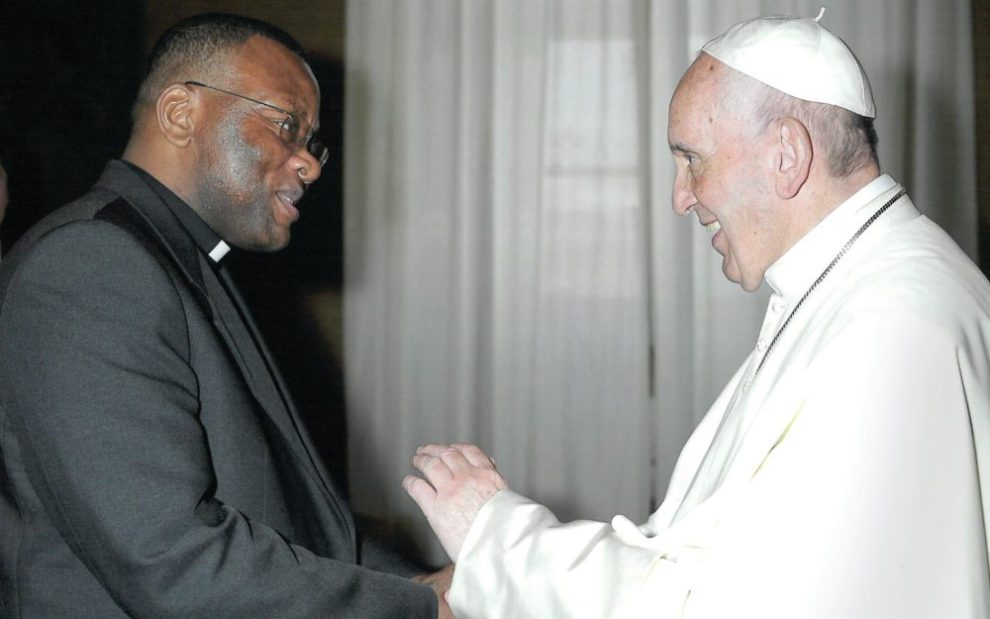As 2022 begins, despite strong desires to move on, the world still finds itself mired in pandemics. The fall semester was one of stark juxtaposition. On my campus, students and faculty found comfort returning to in-person classes with the protection of both the vaccine and indoor masking. Just as New York began returning to more normal activity, I received word that a beloved colleague and friend died in Rome, just as it seemed he had fully recovered from COVID-19.
Known for his compassion and joy, Jesuit Father Jacquineau Azétsop was a leading Catholic voice for global health equity. I was honored to call him my classmate and friend. A bioethicist from Cameroon, Azétsop was a devoted priest and his academic work always remained firmly rooted in the preferential option for the poor. Inclusive and generous, he was known as a mentor to countless young African priests studying in Nairobi, Rome, and even New York. In 2018, when I brought a first-year theology class to Rome, he told them about the church in Africa and his own work calling for a social justice approach to HIV/AIDS in Africa. Moved by his witness, my students saw both the church and HIV/AIDS in a new light.
Addressing health challenges locally requires knowledge of society and global institutions.Father Jacquineau Azétsop, S.J.
An exemplary scholar, Azétsop argued for an integrated and participatory approach to public health in which the flourishing of those on the margins became our central focus. “Addressing health challenges locally requires knowledge of society and global institutions,” he argued, “as distinct from knowledge of diseases.” Health crises are always deeply connected to political, social, and economic realities.
The COVID-19 pandemic is not an isolated or singular event. It must be seen within the context of another pandemic—that of extreme economic inequality. In his COVID-19 catechesis messages, Pope Francis points out that “the pandemic has exposed the plight of the poor and the great inequality that reigns in the world. And the virus, while it does not distinguish between people, has found, in its devastating path, great inequalities and discrimination. And it has exacerbated them!”
While we have all struggled over the last two years, the pandemic has not affected communities equally. Those living in poverty are less likely to have jobs with flexible remote working options, affordable child care, and sufficient healthcare access. As we widen our lens globally, there is profoundly unjust, unequal access to COVID-19 vaccines. According to the New York Times, 76 percent of doses have been administered in high- or upper-middle income countries. As of November 2021, more than 53 million doses have been administered but only 8.2 percent of Africans have had at least one dose. In Cameroon, only 0.6 percent of the population is fully vaccinated.
Speaking virtually to the World Meeting of Popular Movements, Pope Francis implored pharmaceutical companies, in the name of God, “to release the patents. Make a gesture of humanity and allow every country, every people, every human being, to have access to the vaccines.” Appealing to the principles of solidarity and the universal destination of goods, Pope Francis has consistently called to put people over patents.
Without attention to the deeper political, social, and economic inequalities, our social sin will continue to deepen.
Right now, we have a choice, as the pope notes, as with any crisis: “Either we come out of it better or we come out of it worse.” This choice is both local and global. “As science and technology develop, our structural sin deepens,” cautions public health and human rights expert Dr. Paul Farmer. The development of mRNA vaccine technology represents an exciting moment of discovery. Similarly, the World Health Organization is poised to recommend widespread use of the first vaccine for malaria. Yet, without attention to deeper political, social, and economic inequalities, our social sin will continue to deepen. The technical ability to prevent or cure COVID-19 or malaria, or even HIV/AIDS alone, will never be enough.
In his tragically brief time as a scholar and priest, my friend Jacquineau worked for greater participation by African communities in building systems of public health. Justice can only be achieved from the ground up and with the participation of those on the margins. African anthropology rejects an individualistic vision of the human condition, and human relationality is one place, he argued, that listening to the African experience would help bring about greater justice throughout the world. In this moment of liminality, we can choose the common good. Technology cannot save us, but it can be placed in service of building more just communities. The work then is up to us, locally and globally, together.
This article also appears in the January 2022 issue of U.S. Catholic (Vol. 87, No. 1, pages 40-41). Click here to subscribe to the magazine.
Image: Courtesy of Pontifical Gregorian University
















Add comment